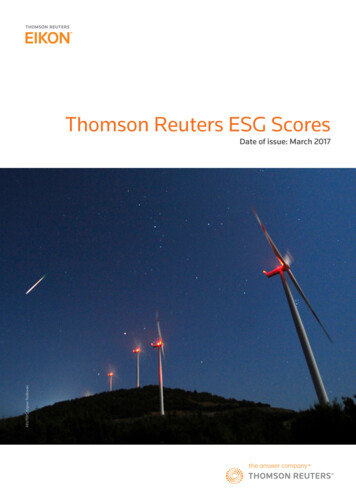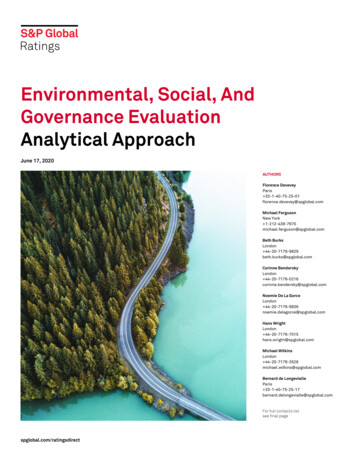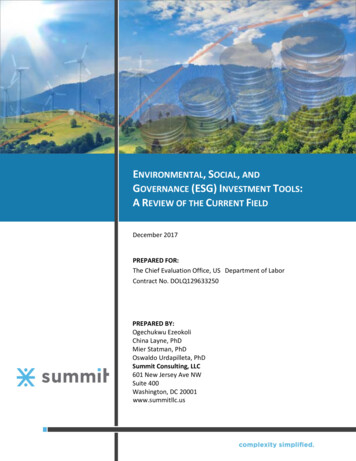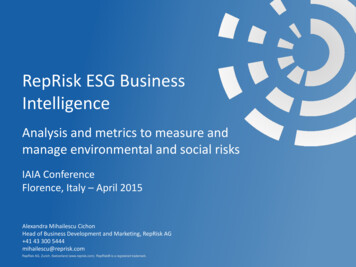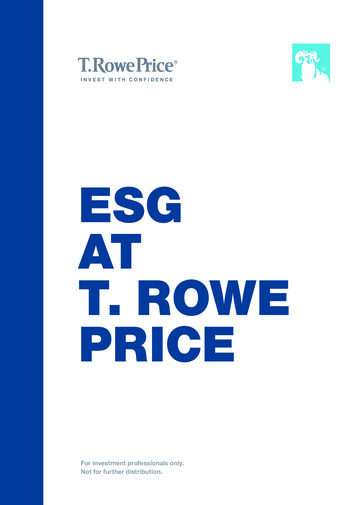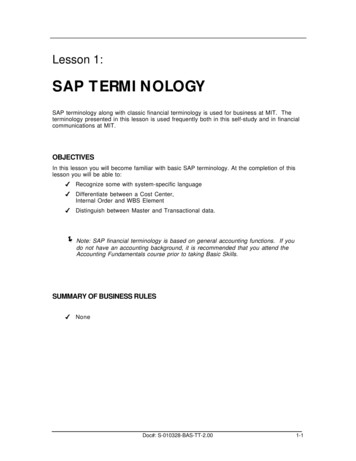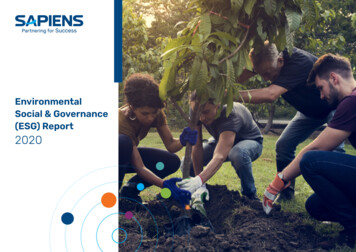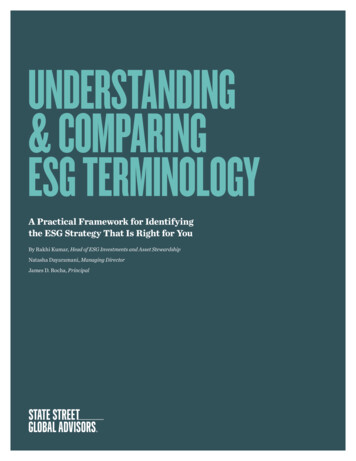
Transcription
UNDERSTANDING& COMPARINGESG TERMINOLOGYA Practical Framework for Identifyingthe ESG Strategy That Is Right for YouBy Rakhi Kumar, Head of ESG Investments and Asset StewardshipNatasha Dayaramani, Managing DirectorJames D. Rocha, Principal
BackgroundAccording to a survey of 475institutional investors titled“Performing for the Future,” morethan half of institutions that haveadopted environmental, social andgovernance (ESG) investing cite alack of clarity over ESG terminology.1At the heart of the challenge is thatthe terms used to describe the variousESG strategies are not universallydefined and can mean different thingsto different investors.To address this problem, we reviewedthe usage and definitions of ESGterminology adopted by a broad rangeof industry participants, includingstandard setters, asset managers,data providers and academics. Eventhough there is some variation in thenomenclature, we found generalconsensus in the marketplace forfive dominant and distinct ESGstrategies. On page 4, we presentthese strategies in a practicalframework that reconciles thedefinitions with the underlyingobjectives and considerations of eachstrategy. This framework has beendeveloped to facilitate conversationswith investors and help them choosethe ESG approach that meets theirinvestment objectives.In our research we also found thatthere was no market consensus forterms that describe the overall genreof investing that incorporates ESGfactors into the investment process.1Performing For the Future, Longitude Research, April 2016.In Figure 1 on the next page weexplore ESG investing through ahistorical lens to understand thenuanced differences between SocialResponsible Investing (SRI),Responsible Investing (RI),Sustainable Investing (SI) and ESGInvesting. At State Street GlobalAdvisors, we view ESG investing asthe most appropriate term to describethe overall genre since it incorporatesall factors — environmental, socialand governance.Today, investors are increasinglyaccepting that material ESG factorsnot only impact the financialperformance of companies but alsohave societal and environmentaloutcomes. However, obtainingdata from portfolio companiesand reaching consensus in themarketplace about which ESGfactors materially impact eachindustry remains a challenge.Nevertheless, by supportinginitiatives such as the SustainableAccounting Standards Board (SASB),the industry is moving closer tocommon ESG reporting standards.56%of ESG adopters saythere is a lack of clarityover ESG terminologyAs ESG investing continuesto grow, we expect that thestrategies that comprise ESGinvesting will also evolve tomeet changing clientobjectives, new opportunitiesand better data quality.Further, the development of emergingtechnologies like big data andartificial intelligence are makingit increasingly possible for assetmanagers to perform complexanalysis on data sets to furtherimprove investment decisions.State Street Global Advisors2
Figure 1The History and Evolutionof ESG Investing1920s 1930s 1990s 2000sLatest IterationSocially ResponsibleInvesting (SRI)ResponsibleInvesting (RI)SustainableInvesting (SI)Rooted in religious values(Tohra, Old Testament, Sharia etc.)Differing views of what to deemsocially responsible resulted in someinvestors dropping the “S” from SRIThe ecological word‘sustainability’ wasintroduced in the 1990sThe Great Depression and a numberof corporate scandals andcontroversies lead to more focuson governance issuesIncreased awarenessabout climate changeFirst SRI fund launched in 1928(Pioneer Fund) focused onexclusionary screens based onsocial issues — ex tobacco,alcohol and gamblingStrong demand for SRIproducts resulted in the launch ofmany other values-based fundsESGESGInvestingInvestingUK Pensions Act is amendedin 2000 to require theconsideration of ESG issuesduring the investment processIn 2006, the United Nationslaunched its Principles ofResponsible Investing, whichrequire the incorporation of ESGissues into the investment processReconciling the VariousESG StrategiesWe have identified five primarystrategies of ESG investing —exclusionary screening, positivescreening, ESG integration, impactinvesting and active ownership. Thesestrategies reflect a wide range ofobjectives that include avoiding orreducing ESG risks, generating higherinvestment returns and seekingmeasurable impact, among others.They also reflect a wide range ofinvestment and impact considerationsthat investors should take intoaccount before investing. In ourFramework for Understanding ESGStrategies on the next page, wereconcile the definitions with theunderlying objectives andconsiderations of each strategy. It’sworth noting that some objectivesspan different ESG strategies tovarying degrees, and multiple ESGstrategies can be combined within asingle investment vehicle to achievethe unique goals of investors.Contrary to popular belief, thesestrategies can be implemented acrossasset classes and investment styles.For instance, at State Street GlobalAdvisors we offer equity and fixedincome ESG products within beta,smart beta and actively managedinvestment strategies.State Street Global Advisors3
SSGA’s Framework for Understandingand Comparing ESG StrategiesEXCLUSIONARY SCREENINGPOSITIVE SCREENINGESG INTEGRATIONIMPACT INVESTINGACTIVE OWNERSHIPTilts portfolio toward one of following:Incorporates ESG data, alongsidetraditional financial analysis, into thesecurities selection processTargets a measurable positive social and/orenvironmental impact. Investments aregenerally project specificEntails engaging with companies andvoting company shares on a variety ofESG issues to initiate changes in behavioror in company policies and practicesGenerate and measure specific socialand/or environmental benefits thatalign with purposeInfluence company strategy for long-termvalue creationDEFINITIONExcludes, from the investment universe,companies, sectors or countries involved inactivities that do not align with the moralvalues of investors or with global standardsaround human rights, labor practices, theenvironment and anti-corruptionBest in class: companies outperformingpeers in ESG measuresESG momentum: companies improvingESG measures more quickly than peersThematic investing: companies solvingspecific ESG challenges (climate change,gender diversity, etc.)COMMON OBJECTIVESAlign portfolios with investors’ moral andethical valuesMitigate ESG risksMitigate ESG risksAchieve higher returnsAchieve higher returnsMitigate ESG risksSupport a business model that aims to solvean environmental or social problemInfluence a company to change its businessmodel or stop an objectionable practiceHelp company management capture valueby mitigating risk or seeking opportunitiesAdvance ESG disclosure and practicesImprove or maximize a portfolio’s ESG scoreINVESTMENT CONSIDERATIONSIntroduces tracking error andpotentially impacts performanceSecurities selection is based predominatelyon ESG scores and ratings. Sourcing qualityESG data remains a challengeSourcing quality ESG data remains achallenge. Securities selection is based onquantitative and qualitative assessment ofESG factors, requiring analyst expertise.A long-term mindset is necessary as it isdifficult to time the occurrence of a negativeevent resulting from an ESG issueInvestments may be illiquid and investmentreturns could aim to be at or above themarket rateA significant ownership stake is neededto exert influence. Substantial resourcesare also needed to engage withcompanies. Active ownership is crucialfor index strategiesRewards companies that have higher ESGscores with capital. Impact is generallytargeted around specific sectors or themes(e.g. climate change, gender diversity, etc.)No deliberate impact strategy as theprimary objective is to achieve higherreturns and/or mitigate ESG risksImpact is highly targeted on specific outcomesBroad impact due to continuedengagement with company managementon ESG issuesEquity fund that invests in oil& gas companies deemed to beleast carbon intensiveActively managed fixed income fundthat considers ESG issues during thesecurities selection processCommunity investment fund thatprovides micro financing to low-incomeor disadvantaged communitiesCould apply to any fund (including thosenot tagged as ESG funds) where the assetmanager or asset owner is committed toactive ownershipIMPACT CONSIDERATIONSGenerally can’t impact companies in whichyou don’t own shares, but well-coordinateddivestment campaigns can be effectiveEXAMPLESEquity fund that excludes companies thatgenerate more than 5% of their revenuefrom the sale of tobacco products
Advantages of Adoptinga Common VernacularEstablishing a standard language can help asset owners, assetmanagers, consultants and advisors more clearly communicatewith each other. Using language more deliberately and preciselycan also help investors begin to address some of the practicalsteps involved in ESG investing. These steps, which we call theinvestor challenge, include:1Identifying beliefs and objectives2Educating internal investment staff3Engaging stakeholders, such as beneficiaries4Choosing the right ESG strategy5Manager selection6Measuring and monitoring performance and impact7Reviewing and fine-tuning a long-term strategyTo learn more about ESGterminology and how toincorporate ESG into your portfolio,contact your relationship manageror email us at: esg@ssga.com.Visit ssga.com for ESG insightsand research.With 176 billion in dedicated ESGassets under management,2 wedraw on a rich 30-year heritage ofESG innovation and helping clientsachieve their ESG objectives.When you partner with SSGA,you’ll have the full resources ofone of the world’s largest ESGmanagers working for you — notonly in ESG portfolio management,but in investment research anddata analytics.We are committed to helping ourclients harness the potential ofESG investing and to transformtheir ESG ambitions into action.2Source: SSGA as at 31 December 2016.State Street Global Advisors5
About State Street Global AdvisorsFor four decades, State Street Global Advisors has servedthe world’s governments, institutions and financial advisors.With a rigorous, risk-aware approach built on research,analysis and market-tested experience, we build from abreadth of active and index strategies to create cost-effectivesolutions. As stewards, we help portfolio companies see thatwhat is fair for people and sustainable for the planet candeliver long-term performance. And, as pioneers in index,ETF, and ESG investing, we are always inventing new waysto invest. As a result, we have become the world’s thirdlargest asset manager with US 2.72 trillion* under our care.* AUM reflects approximately 32.9 billion (as of June 30, 2018), with respect towhich State Street Global Advisors Funds Distributors, LLC (SSGA FD) servesas marketing agent; SSGA FD and State Street Global Advisors are affiliated.ssga.comState Street Global Advisors Worldwide EntitiesAustralia: State Street Global Advisors, Australia, Limited (ABN 42 003 914 225)is the holder of an Australian Financial Services Licence (AFSL Number 238276).Registered office: Level 17, 420 George Street, Sydney, NSW 2000, Australia. T: 612 9240 7600. F: 612 9240 7611. Belgium: State Street Global Advisors Belgium,Chaussée de La Hulpe 120, 1000 Brussels, Belgium. T: 32 2 663 2036. F: 32 2 6722077. SSGA Belgium is a branch office of State Street Global Advisors Limited.State Street Global Advisors Limited is authorized and regulated by the FinancialConduct Authority in the United Kingdom. Canada: State Street Global Advisors,Ltd., 770 Sherbrooke Street West, Suite 1200 Montreal, Quebec, H3A 1G1, T: 514282 2400 and 30 Adelaide Street East Suite 500, Toronto, Ontario M5C 3G6. T: 647775 5900. Dubai: State Street Bank and Trust Company (Representative Office),Boulevard Plaza 1, 17th Floor, Office 1703 Near Dubai Mall & Burj Khalifa, P.O Box26838, Dubai, United Arab Emirates. T: 971 (0)4 4372800. F: 971 (0)4 4372818.France: State Street Global Advisors Ireland Limited, Paris branch is a branch ofState Street Global Advisors Ireland Limited, registered in Ireland with companynumber 145221, authorized and regulated by the Central Bank of Ireland, and whoseregistered office is at 78 Sir John Rogerson’s Quay, Dublin 2. State Street GlobalAdvisors Ireland Limited, Paris Branch, is registered in France with company numberRCS Nanterre 832 734 602 and whose office is at Immeuble Défense Plaza, 23-25rue Delarivière-Lefoullon, 92064 Paris La Défense Cedex, France. T: ( 33) 1 44 45 4000. F: ( 33) 1 44 45 41 92. Germany: State Street Global Advisors GmbH, BriennerStrasse 59, D-80333 Munich. Authorized and regulated by the Bundesanstalt fürFinanzdienstleistungsaufsicht (“BaFin”). Registered with the Register of CommerceMunich HRB 121381. T: 49 (0)89 55878 400. F: 49 (0)89 55878 440. Hong Kong:State Street Global Advisors Asia Limited, 68/F, Two International Finance Centre,8 Finance Street, Central, Hong Kong. T: 852 2103 0288. F: 852 2103 0200.Ireland: State Street Global Advisors Ireland Limited is regulated by the CentralBank of Ireland. Registered office address 78 Sir John Rogerson’s Quay, Dublin 2.Registered number 145221. T: 353 (0)1 776 3000. F: 353 (0)1 776 3300. Italy:State Street Global Advisors Limited, Milan Branch (Sede Secondaria di Milano) isa branch of State Street Global Advisors Limited, a company registered in the UK,authorized and regulated by the Financial Conduct Authority (FCA ), with a capitalof GBP 62,350,000, and whose registered office is at 20 Churchill Place, LondonE14 5HJ. State Street Global Advisors Limited, Milan Branch (Sede Secondaria diMilano), is registered in Italy with company number 06353340968 - R.E.A. 1887090and VAT number 06353340968 and whose office is at Via dei Bossi, 4 - 20121 Milano,Italy. T: 39 02 32066 100. F: 39 02 32066 155. Japan: State Street Global Advisors(Japan) Co., Ltd., Toranomon Hills Mori Tower 25F 1-23-1 Toranomon, Minato-ku,Tokyo 105-6325 Japan, T: 81-3-4530-7380 Financial Instruments Business Operator,Kanto Local Financial Bureau (Kinsho #345) , Membership: Japan Investment AdvisersAssociation, The Investment Trust Association, Japan, Japan Securities Dealers’Association. Netherlands: State Street Global Advisors Netherlands, Apollo Building,7th floor Herikerbergweg 29 1101 CN Amsterdam, Netherlands. T: 31 20 7181701.SSGA Netherlands is a branch office of State Street Global Advisors Limited. StateStreet Global Advisors Limited is authorized and regulated by the Financial ConductAuthority in the United Kingdom. Singapore: State Street Global Advisors SingaporeLimited, 168, Robinson Road, #33-01 Capital Tower, Singapore 068912 (CompanyReg. No: 200002719D, regulated by the Monetary Authority of Singapore). T: 656826 7555. F: 65 6826 7501. Switzerland: State Street Global Advisors AG,Beethovenstr. 19, CH-8027 Zurich. Authorized and regulated by the EidgenössischeFinanzmarktaufsicht (“FINMA”). Registered with the Register of Commerce ZurichCHE-105.078.458. T: 41 (0)44 245 70 00. F: 41 (0)44 245 70 16. United Kingdom:State Street Global Advisors Limited. Authorized and regulated by the FinancialConduct Authority. Registered in England. Registered No. 2509928. VAT No. 577659181. Registered office: 20 Churchill Place, Canary Wharf, London, E14 5HJ. T: 020 33956000. F: 020 3395 6350. United States: State Street Global Advisors, One IronStreet, Boston MA 02210. T: 1 617 786 3000. 2018 State Street Corporation. All Rights Reserved.ID14509-2272327.1.1.AM.RTL 1018 Exp. Date: 09/30/2019
analysis on data sets to further improve investment decisions. 56% of ESG adopters say there is a lack of clarity over ESG terminology 1 Performing For the Future, Longitude Research, April 2016. As ESG investing continues to grow, we expect that the strategies that comprise ESG investing will also evolve to meet changing client objectives, new opportunities and better data quality. State .
